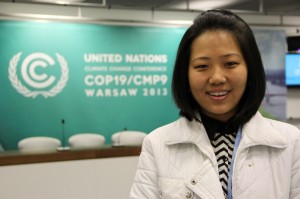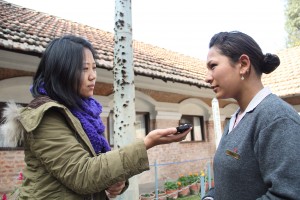Journalists@Work: Bhrikuti Rai
Bhrikuti Rai is a journalist at the English-language Nepali Times, a weekly publication based in Kathmandu. The 25-year-old completed an undergraduate course in Media Studies at Kathmandu University, but says her real education began when she started working, learning from fellow journalists in the field and in the newsroom.
While she covers politics and business, for the past several years she’s expanded her beat to include the environment — an issue of critical importance for mountainous Nepal, which is highly vulnerable to the effects of climate change. Bhrikuti recently participated in a regional workshop on environmental reporting in Chennai, India, and was selected to attend the UN Climate Change Conference in Warsaw in November 2013.
Why did you decide to become a journalist?
I never thought I would actually become a journalist. Given the limited number of subjects to choose from, I just kept ending up in every journalism class from high school to university. But so far I am enjoying what I do, and that has a lot to do with the people who mentored me from the beginning, helping me hone my craft. It has been an exciting journey learning from each story I cover, meeting new people and if what I do becomes a way for someone somewhere to tell their story, I am motivated to do better journalism.
What did your parents and friends say when you decided to become a journalist? Do reporters have a good reputation in Nepal?
My parents and friends have always been very supportive. There are times when they worry because of my odd working hours and trips to the field, but they’ve never tried to push me into doing something I am not interested in.
It is difficult to assess the reputation since professional journalism began in Nepal less than two decades ago. There will always be some rotten apples along the way but journalists need to be cautious and not bring a bad name to the profession.
What do you like most about your job?
The fact that it is not a 9-to-5 job and it has helped me learn more about my country and its people in a way probably no other profession would have.
What do you dislike most about your job?
We have no holidays. 😉
What was the most difficult story you have covered?
I think no story is easy to cover, but there was one particular story about health care in one of the most rural districts of Nepal. I had to go undercover and access a lot of legal documents to back up my story. It was a bit more intensive than others.
Has any one story particularly affected you?
A story I did on a female migrant worker who was raped and robbed by airport officials last year. I have been following the story and am appalled by the lack of or speed of justice in Nepal. Impunity goes unchecked if powerful people are involved. That story just makes you believe a little less in the country’s justice system.
How do you feel you are developing as a journalist and advancing along your career path?
I am thankful to all the people I have worked with who have helped me learn the ropes, although there is still a lot to learn. Right now to advance my career path I really need to get a firm grip on digital media, which is bringing about a massive change in storytelling. I am trying to use online resources to better understand new ways of telling stories. I believe they will shape the future of media.
 You recently went to Warsaw and attended the UN climate conference there. What was that experience like?
You recently went to Warsaw and attended the UN climate conference there. What was that experience like?
Attending the UN Climate Conference in Warsaw was a great learning experience. It helped that we weren’t just left there to report on it but had two wonderful mentors who helped us get on track even before the conference began. It helped me better understand the complexities of the conference, as well as the politics and science of climate change. The experience will come in handy if and when I have to report from these kinds of overwhelmingly large-scale events.
What did you learn there and how will you use it in your future work?
Breaking down the various components of climate change during the two weeks gave me a comprehensive understanding of the subject matter. Most of all I learned how to recognize the story that is best suited for my audience and not get lost in the maze of stories when covering an event like this. I will make the most of the people I met at the conference and will definitely use these resources and tools in my future work.
What kind of equipment do you use?
I use my phone to record video and audio. I also use a camera.
What kind of media do you consume?
I consume every form of media available online. I have stopped watching TV almost completely and I look forward to doing without a newspaper subscription since it is all available online for free.
What are your goals as a journalist?
I hope to be medium for people and their stories. Most of all I aspire to do journalism that makes people angry, and maybe then they will start doing something about issues that affect them every day.





Feedback